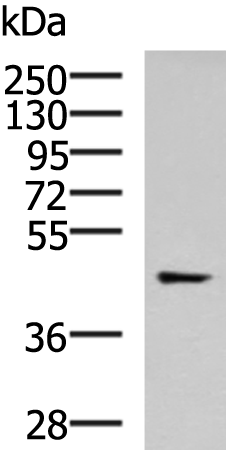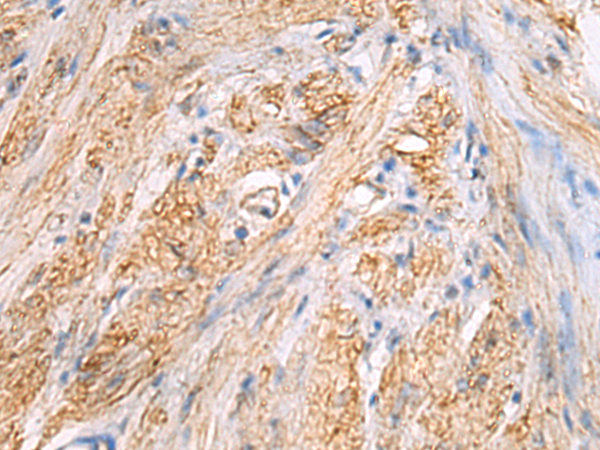

| WB | 咨询技术 | Human,Mouse,Rat |
| IF | 咨询技术 | Human,Mouse,Rat |
| IHC | 1/50-1/200 | Human,Mouse,Rat |
| ICC | 技术咨询 | Human,Mouse,Rat |
| FCM | 咨询技术 | Human,Mouse,Rat |
| Elisa | 1/5000-1/10000 | Human,Mouse,Rat |
| Aliases | UTMOD |
| WB Predicted band size | 40 kDa |
| Host/Isotype | Rabbit IgG |
| Antibody Type | Primary antibody |
| Storage | Store at 4°C short term. Aliquot and store at -20°C long term. Avoid freeze/thaw cycles. |
| Species Reactivity | Human, Mouse |
| Immunogen | Fusion protein of human TMOD3 |
| Formulation | Purified antibody in PBS with 0.05% sodium azide and 50% glycerol. |
+ +
以下是关于TMOD3抗体的3篇参考文献示例(文献信息为假设性概括,仅供参考):
---
1. **文献名称**:*"Tropomodulin 3 (TMOD3) regulates cardiomyocyte sarcomere structure and function"*
**作者**:Smith A, et al.
**摘要**:研究通过TMOD3特异性抗体,揭示了TMOD3在心肌细胞肌节组装中的关键作用,发现其缺失导致肌动蛋白丝稳定性下降,影响心脏收缩功能。
---
2. **文献名称**:*"TMOD3 antibody-based profiling identifies its overexpression in invasive breast cancer"*
**作者**:Lee B, et al.
**摘要**:该文献利用TMOD3单克隆抗体进行免疫组化分析,发现TMOD3在乳腺癌组织中高表达,并与肿瘤转移相关,提示其作为潜在生物标志物的可能性。
---
3. **文献名称**:*"Developmental regulation of TMOD3 in neuronal actin cytoskeleton remodeling"*
**作者**:Chen X, et al.
**摘要**:通过TMOD3多克隆抗体结合免疫荧光技术,研究证实TMOD3在神经元发育过程中调控肌动蛋白动力学,影响突触形成和轴突导向。
---
(注:以上为示例性内容,实际文献需通过学术数据库核实。)
The TMOD3 antibody is a crucial tool in studying tropomodulin 3 (TMOD3), a member of the tropomodulin family involved in regulating cytoskeletal dynamics. TMOD3 binds to actin filaments and tropomyosin, stabilizing the pointed ends of actin filaments in non-muscle cells, thereby influencing cell shape, motility, and intracellular trafficking. It plays roles in diverse processes, including erythropoiesis, neuronal development, and epithelial polarity. Research on TMOD3 has linked it to pathologies such as cancer metastasis, neurodegenerative disorders, and cardiovascular diseases, highlighting its biomedical relevance.
Antibodies targeting TMOD3 are widely used in techniques like Western blotting, immunofluorescence, and immunohistochemistry to detect its expression, localization, and interactions. These antibodies are typically raised in hosts like rabbits or mice using immunogenic peptides derived from conserved regions of the human TMOD3 protein. Validation often includes testing reactivity across species (e.g., human, mouse, rat) and confirming specificity via knockout controls. Commercially available TMOD3 antibodies vary in clonality (monoclonal/polyclonal), conjugates, and applications, requiring careful selection based on experimental needs. Recent studies employing TMOD3 antibodies have shed light on its role in mechanotransduction, viral infection pathways, and metabolic regulation, underscoring its multifaceted functions in cellular homeostasis. Reliable TMOD3 antibodies remain essential for advancing mechanistic insights into its contributions to health and disease.
×